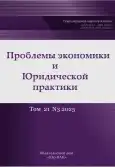Digital Rights to the Results of Intellectual Activity and their Use in Industry
- Autores: Loseva O.V.1
-
Afiliações:
- Financial University under the Government of the Russian Federation
- Edição: Volume 21, Nº 3 (2025)
- Páginas: 159-165
- Seção: Regional and Sectoral Economics
- URL: https://journal-vniispk.ru/2541-8025/article/view/313199
- DOI: https://doi.org/10.33693/2541-8025-2025-21-3-159-165
- EDN: https://elibrary.ru/XLEDIA
- ID: 313199
Citar
Resumo
The purpose of the study. The article discusses issues related to the specifics of the use of digital intellectual property rights in industry. In accordance with this, the purpose of the article is to identify digital rights to the results of intellectual activity (RID) and/or their use and substantiate the directions of their application by industrial companies. To achieve this goal, the following tasks have been set and solved:
- the types of digital rights to READ and/or their use are defined;
- the advantages of digital REED rights in comparison with traditional licensing are shown;
- the directions of application of digital REED rights in industry are indicated;
- the economic and social effects of the application of digital REED rights and/or their use for industrial companies are shown.
Conclusions. In Russian legislation, it is possible to use digital rights in the form of utilitarian or hybrid digital rights that differ from each other in functionality, legal status, technological essence, risk level for the investor, and other characteristics. Digital READ rights have advantages over traditional licensing by reducing bureaucratic procedures, ensuring transparency and security of transactions, and speeding up the turnover of READ rights. In practice, USPS and PPP are most often implemented on the basis of distributed ledger technology and involve the use of tokens and smart contracts with different technological essence, functionality and flexibility. They can be used in different industries and for different purposes, providing industrial companies with legal protection of intellectual developments, facilitating technology transfer and licensing, which will contribute to the digital transformation of production and achieve the economic and social effects described in the article.
Texto integral
##article.viewOnOriginalSite##Sobre autores
Olga Loseva
Financial University under the Government of the Russian Federation
Autor responsável pela correspondência
Email: ovloseva@fa.ru
ORCID ID: 0000-0002-5241-0728
Código SPIN: 9589-6287
Scopus Author ID: 370391
Dr. Sci. (Econ.), Associate Professor, Professor of the Department of Corporate Finance and Corporate Governance of the Faculty of Economics and Business
Rússia, MoscowBibliografia
- Arnautov D. R., Erokhina M. G. Digital assets in the system of Russian law. Russian Law Journal. 2019;(4):148-157.
- Begnarskiy V.V. Intellectual property as an element of the innovation process in industry // Theory and practice of social development. 2023. No. 2. pp. 114–120. https://doi.org/10.24158/tipor.2023.2.16.
- Loseva O. V., Abdikeev N. M. Identification of digital intellectual assets and features of their commercialization. Management Sciences = Management Sciences in Russia. 2023;13(3):34-46. doi: 10.26794/2404-022X-2020-13-3-34-46.
- Chebykina M.V., Stepanov E.V., Zhityaeva O.I. Methodological support of management decisions in the innovation activity of industrial enterprises based on the use of intellectual property // Bulletin of Samara University. Economics and management. 2022. Vol. 13, No. 3. pp. 114–122. https://doi.org/10.18287/2542-0461-2022-13-3-114-1225.
- Hermeto J.R. Towards a critique on intellectual property // Revista Katalysis. 2020. Vol. 23, No. 3. P. 399–408. https://doi.org/10.1590/1982-02592020v23n3p399.
- Kagermann H., Wahlster W. Ten years of Industry 4.0 // Sci. 2022. Vol. 4, No. 3. P. 26. https://doi.org/10.3390/sci4030026.
Arquivos suplementares












